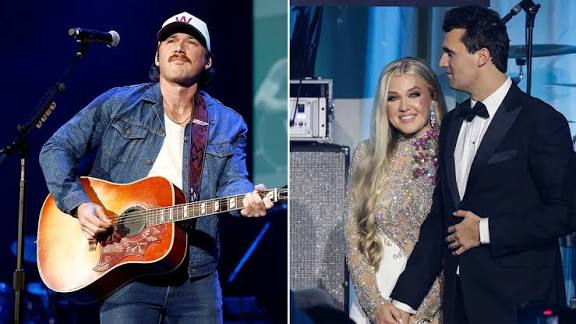Morgan Wallen’s Raw Tribute to Charlie Kirk: A Moment Nobody Expected

The final concert of Morgan Waln of the IM The Problem Tour in Edmonton included a hearty tribute to Charlie Kirk, who was recently shot. Today we will discuss about Morgan Wallen’s Raw Tribute to Charlie Kirk: A Moment Nobody Expected
Morgan Wallen’s Raw Tribute to Charlie Kirk: A Moment Nobody Expected
When news broke that Charlie Kirk, the conservative activist and founder of Turning Point USA, had been fatally shot on September 10, 2025, it sent shockwaves through American politics, media, and beyond. Amid the grief, unrest, and fervent public debate, one moment cut through the noise with surprising clarity: country singer Morgan Wallen pausing his concert in Edmonton to pay tribute. It was raw, it was emotional, and perhaps above all, it was unexpected.
Who Was Charlie Kirk — a Short Reprise

Before diving into the moment, it helps to sketch who Charlie Kirk was, and what his death means in the current climate.
Background: Charlie Kirk, aged 31, was a prominent political commentator, speaker, and activist. He founded Turning Point USA, was host of The Charlie Kirk Show, and was a polarizing figure in U.S. conservative politics.
The incident: He was shot while speaking at Utah Valley University during a stop on his “American Comeback Tour.” He leaves behind his wife, Erika Frantzve Kirk, and two young children.
Public reaction: His death stirred tributes across political lines, with both supporters and critics expressing shock. Debates about gun violence, political polarization, free speech, and the role of public figures only intensified.
The Concert That Turned Into a Tribute
On September 12, 2025, two days after Kirk’s death, Morgan Wallen was performing at Commonwealth Stadium in Edmonton, Alberta, as part of his I’m the Problem tour. Like many of his shows, it was loud, energetic, full of passion, hard-twanging country music, and large crowds. Then, Wallen paused.
He prefaced the song “I’m a Little Crazy” by saying:
“I’m not going to say a whole bunch on this, but this song right here has been hitting me harder in the last couple days.”
Then, addressing Erika Kirk, he said:
“I just wanted to let Erika Kirk know that me and my family are sending prayers her way.”
Then he launched into “I’m a Little Crazy”, a song whose lyric “I’m a little crazy, but the world’s insane” seemed to take on new meaning under the weight of the moment. As he sang, his voice shook with emotion; the crowd lit up the stadium with cell phones, and what was supposed to be just another concert became something more communal, something reclamatory.
Why It Was Raw — And Why That Matters
That moment matters for several reasons. It wasn’t planned, publicized, or polished—it was spontaneous, sincere, and exposed vulnerability. Here are some of the dimensions that make it unique:
Emotional Transparency
Wallen rarely uses the spotlight to make political statements, yet here he allowed grief and empathy to show. He didn’t lavish praise or take sides; he expressed a human moment, almost universal: loss, sympathy, confusion. That kind of transparency isn’t often seen in large public figures in polarized times.Crossing Cultural Boundaries
Country music and political activism are intertwined in the U.S., but usually in expected ways—campaign endorsements, benefit concerts, etc. This is different. A figure from mainstream entertainment paying tribute to a polarizing political figure—this pushes through cultural silos, if only momentarily. For many fans, regardless of their political stance, it reminded them of shared humanity.The Power of Music as a Vessel
The lyrics of “I’m a Little Crazy”—especially “I’m a little crazy, but the world’s insane”—echoed the collective sense of chaos and grief. The song became more than its melody; it turned into an expression of what many were feeling but perhaps hadn’t spoken aloud.The Public’s Role
The audience’s reaction—phones held aloft, people singing along, a stunned yet unified response—amplified the moment. It’s one thing for Wallen to say something; it’s another for the crowd to receive it so viscerally. The shared silence, the crowd participation, the emotional feedback loop made the concert part vigil, part musical gathering of mourning.
Reactions & Ripples Across the Country
In the immediate aftermath, reactions came fast, varied, and intense.
Praise: Many fans and observers saw Wallen’s tribute as brave and necessary. Some noted it as rare that an entertainment figure would pause, in the middle of a tour, and speak directly to such a tragic political event. Social media lit up with posts about empathy, unity, and Wallen showing that even amidst political division, grief transcends.
Criticism / Skepticism: Not everyone saw it purely positively. Some criticized the timing or viewed it as opportunistic, or questioned whether public figures can separate their beliefs from their activities when engaging in tributes tied to political figures. However, no major scandal seems to have resulted directly from Wallen’s act. (At least, not in the sources currently available.)
Media Response: News outlets across political spectra noted the tribute. Some emphasized the emotional side, others the potential political overtones. But most coverage agreed: this was more than just a song; it was a public moment of grief, vulnerability, and perhaps hinting at something more—how figures in culture respond to tragedy in an age of division.
Broader Implications
What does this moment reflect about contemporary America, and what might it foreshadow?
1. Grief in the Public Sphere
We are living in a time when public figures—and by extension, the public—are much less able to compartmentalize tragedy. The lines between entertainment, politics, personal space, and public grief blur. Wallen’s tribute is not unique in that sense, but it is particularly potent because it intersects music, politics, and tragedy so abruptly.
2. The Role of Cultural Figures as Moral Witnesses
Celebrities and performers often avoid political or moral statements out of fear of backlash. But when tragedy hits, many feel compelled—some would say obligated—to respond. Moments like Wallen’s suggest that the public increasingly expects artists to bear some witness, to provide more than distraction: to be part of the conversation, perhaps as moral or emotional interpreters.
3. Unity vs. Polarization
In a media landscape dominated by division, soundbites, and tribalism, moments of collective empathy stand out. Wallace Brenner (a scholar of grief in public life) has noted that people often crave these uniting events, where ideological lines fade. Though the response to Charlie Kirk’s death has been contested—as most public figure deaths are—it’s notable that a singer known for his country and sometimes controversial persona became a focal point for a kind of unity.
4. Risk and Reward for Public Figures
There’s risk in stepping into politics or political tragedy. Misstep, misinterpretation, accusation of hypocrisy—all loom. But there’s also reward: authenticity, trust, respect. For Wallen, this moment may deepen his connection with fans who value emotional sincerity over polished distance.
Analyzing Wallen’s Choice
Why this song, at this moment, and this way?
“I’m a Little Crazy” contains lyrics that resonate beyond romantic or existential turbulence: they speak to feeling out of sync with the world, to being overwhelmed. For someone processing sudden loss, those lines ring more deeply. Wallen seemed to choose it not because it directly references Kirk or politics, but because it expressed something many were feeling.
Minimalist speech: He didn’t grandstand. He did not read a prepared statement. He didn’t launch into a political manifesto. The power came in the sparsity—just enough to acknowledge, just enough to connect. That restraint increased its impact.
Setting: The stadium crowd, large and diverse, makes the tribute more public, more powerful. The visuals—lights, phones, crowd reactions—turn it into a communal act, part performance, part mourning. It’s one thing to send condolences via social media; it’s another to stop a concert, address a tragedy, and let a crowd respond.
Limitations, Criticisms, and What It Doesn’t Accomplish
While powerful, the moment is not without its limits, and it doesn’t solve broader issues.
It doesn’t bring answers about how or why the shooting occurred, or address deeper concerns around political violence or gun control directly.
It may be criticized by people who believe public tributes can be hollow—or that they substitute for concrete action.
For fans strongly opposed to Kirk’s views, the tribute might feel like an endorsement; others might struggle with how to interpret it.
It doesn’t necessarily bridge political divides in a lasting way; moments of unity can be fleeting if not followed by structural changes or meaningful dialogue.
What This Moment Means Going Forward
What might this moment presage for cultural dynamics, political expression, and public mourning?
More Artists Will Lean In
We may see more musicians, performers, or entertainers respond swiftly to major political or societal shocks. Not as commentators, but as emotional conduits. The audience increasingly expects authenticity, and public figures may find silence less tenable.Grief as a Shared Landscape
In political polarization, tragedy sometimes provides the rare ground for shared human feelings. “I’m hurting too” may not erase disagreement, but it reminds us of common vulnerability. Wallen’s tribute contributes to a broader pattern of seeing grief not only as private, but as collective.The Rising Role of Social Media Echoes
Videos of the moment spread fast: clips of Wallen’s speech, fan reactions, emotional responses. These amplify the impact beyond those physically present. This is both an opportunity and a challenge: amplification means larger scrutiny—both of praise and of critique.Question of Legacy
For Charlie Kirk’s legacy, moments like this amplify public awareness and memory beyond his political base. For Wallen, it adds a dimension to how he is publicly perceived: not just as a country singer but as someone who, when moved, doesn’t shy away from making that visible. Whether this moment becomes part of his defining image depends in part on how he, or others, build on it.
Conclusion: When Music Meets Mourning
Morgan Wallen’s tribute to Charlie Kirk was raw in its emotion, simple in its form, and profound in what it revealed—not just about the singer, but about public grief, shared spaces, and the power of music. In a moment when many were expected to react, Wallen instead paused, sang, and let a crowd respond. No grand gestures, no political posturing—just a human being trying to reach across a divide with something tender and honest.
And for many, that’s exactly what was needed: a reminder that behind politics there are people, behind ideologies there are lives, and behind grief there is connection. Whether this moment will have long-lasting effects on the public discourse around violence, activism, or unity is uncertain. But at least for a few minutes in Edmonton, it cut through the buzzing static of the culture wars. It reminded us that even in our fractured times, there remains room for shared sorrow, compassion, and a little grace.
How useful was this post?
Click on a star to rate it!
Average rating 0 / 5. Vote count: 0
No votes so far! Be the first to rate this post.
About the Author
usa5911.com
Administrator
Hi, I’m Gurdeep Singh, a professional content writer from India with over 3 years of experience in the field. I specialize in covering U.S. politics, delivering timely and engaging content tailored specifically for an American audience. Along with my dedicated team, we track and report on all the latest political trends, news, and in-depth analysis shaping the United States today. Our goal is to provide clear, factual, and compelling content that keeps readers informed and engaged with the ever-changing political landscape.




